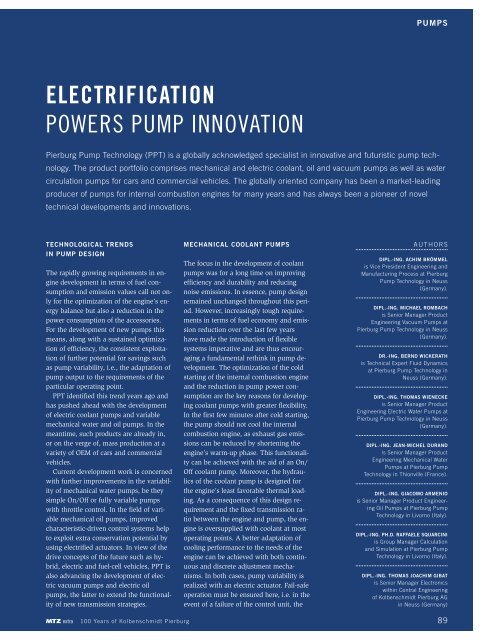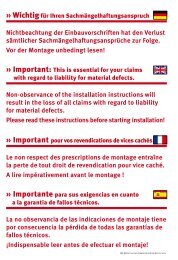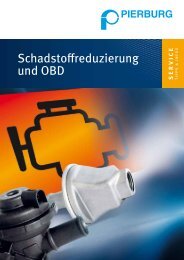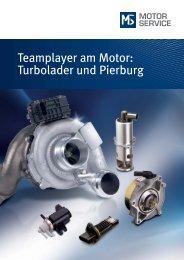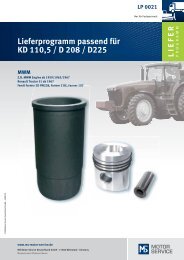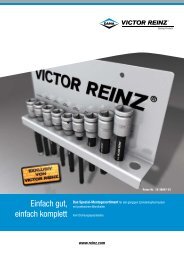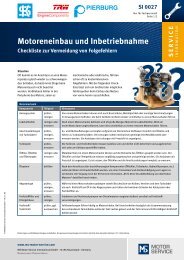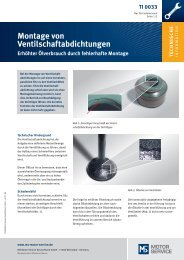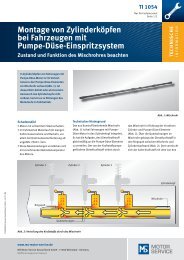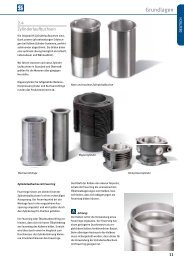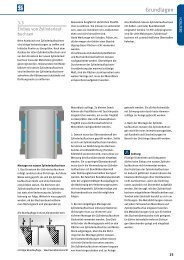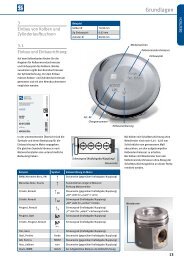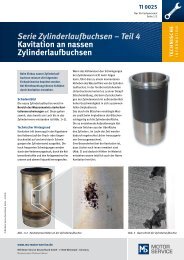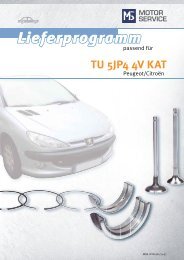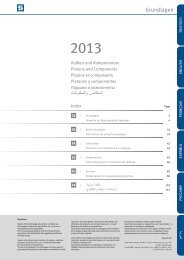Die Sonderausgabe der MTZ hier herunterladen (6 MB - MS Motor ...
Die Sonderausgabe der MTZ hier herunterladen (6 MB - MS Motor ...
Die Sonderausgabe der MTZ hier herunterladen (6 MB - MS Motor ...
Sie wollen auch ein ePaper? Erhöhen Sie die Reichweite Ihrer Titel.
YUMPU macht aus Druck-PDFs automatisch weboptimierte ePaper, die Google liebt.
ELECTRIFICATION<br />
POWERS PUMP INNOVATION<br />
Pierburg Pump Technology (PPT) is a globally acknowledged specialist in innovative and futuristic pump technology.<br />
The product portfolio comprises mechanical and electric coolant, oil and vacuum pumps as well as water<br />
circulation pumps for cars and commercial vehicles. The globally oriented company has been a market-leading<br />
producer of pumps for internal combustion engines for many years and has always been a pioneer of novel<br />
technical developments and innovations.<br />
TECHNOLOGICAL TRENDS<br />
IN PUMP DESIGN<br />
The rapidly growing requirements in engine<br />
development in terms of fuel consumption<br />
and emission values call not only<br />
for the optimization of the engine’s energy<br />
balance but also a reduction in the<br />
power consumption of the accessories.<br />
For the development of new pumps this<br />
means, along with a sustained optimization<br />
of efficiency, the consistent exploitation<br />
of further potential for savings such<br />
as pump variability, i.e., the adaptation of<br />
pump output to the requirements of the<br />
particular operating point.<br />
PPT identified this trend years ago and<br />
has pushed ahead with the development<br />
of electric coolant pumps and variable<br />
mechanical water and oil pumps. In the<br />
meantime, such products are already in,<br />
or on the verge of, mass production at a<br />
variety of OEM of cars and commercial<br />
vehicles.<br />
Current development work is concerned<br />
with further improvements in the variability<br />
of mechanical water pumps, be they<br />
simple On/Off or fully variable pumps<br />
with throttle control. In the field of variable<br />
mechanical oil pumps, improved<br />
characteristic-driven control systems help<br />
to exploit extra conservation potential by<br />
using electrified actuators. In view of the<br />
drive concepts of the future such as hybrid,<br />
electric and fuel-cell vehicles, PPT is<br />
also advancing the development of electric<br />
vacuum pumps and electric oil<br />
pumps, the latter to extend the functionality<br />
of new transmission strategies.<br />
100 Years of Kolbenschmidt Pierburg<br />
MECHANICAL COOLANT PUMPS<br />
The focus in the development of coolant<br />
pumps was for a long time on improving<br />
efficiency and durability and reducing<br />
noise emissions. In essence, pump design<br />
remained unchanged throughout this period.<br />
However, increasingly tough requirements<br />
in terms of fuel economy and emission<br />
reduction over the last few years<br />
have made the introduction of flexible<br />
systems imperative and are thus encouraging<br />
a fundamental rethink in pump development.<br />
The optimization of the cold<br />
starting of the internal combustion engine<br />
and the reduction in pump power consumption<br />
are the key reasons for developing<br />
coolant pumps with greater flexibility.<br />
In the first few minutes after cold starting,<br />
the pump should not cool the internal<br />
combustion engine, as exhaust gas emissions<br />
can be reduced by shortening the<br />
engine’s warm-up phase. This functionality<br />
can be achieved with the aid of an On/<br />
Off coolant pump. Moreover, the hydraulics<br />
of the coolant pump is designed for<br />
the engine’s least favorable thermal loading.<br />
As a consequence of this design requirement<br />
and the fixed transmission ratio<br />
between the engine and pump, the engine<br />
is oversupplied with coolant at most<br />
operating points. A better adaptation of<br />
cooling performance to the needs of the<br />
engine can be achieved with both continuous<br />
and discrete adjustment mechanisms.<br />
In both cases, pump variability is<br />
realized with an electric actuator. Fail-safe<br />
operation must be ensured here, i.e. in the<br />
event of a failure of the control unit, the<br />
PUMPS<br />
AUTHORS<br />
DIPL.-ING. ACHIM BRÖMMEL<br />
is Vice President Engineering and<br />
Manufacturing Process at Pierburg<br />
Pump Technology in Neuss<br />
(Germany).<br />
DIPL.-ING. MICHAEL RO<strong>MB</strong>ACH<br />
is Senior Manager Product<br />
Engineering Vacuum Pumps at<br />
Pierburg Pump Technology in Neuss<br />
(Germany).<br />
DR.-ING. BERND WICKERATH<br />
is Technical Expert Fluid Dynamics<br />
at Pierburg Pump Technology in<br />
Neuss (Germany).<br />
DIPL.-ING. THOMAS WIENECKE<br />
is Senior Manager Product<br />
Engineering Electric Water Pumps at<br />
Pierburg Pump Technology in Neuss<br />
(Germany).<br />
DIPL.-ING. JEAN-MICHEL DURAND<br />
is Senior Manager Product<br />
Engineering Mechanical Water<br />
Pumps at Pierburg Pump<br />
Technology in Thionville (France).<br />
DIPL.-ING. GIACOMO ARMENIO<br />
is Senior Manager Product Engineering<br />
Oil Pumps at Pierburg Pump<br />
Technology in Livorno (Italy).<br />
DIPL.-ING. PH.D. RAFFAELE SQUARCINI<br />
is Group Manager Calculation<br />
and Simulation at Pierburg Pump<br />
Technology in Livorno (Italy).<br />
DIPL.-ING. THOMAS JOACHIM GIBAT<br />
is Senior Manager Electronics<br />
within Central Engineering<br />
of Kolbenschmidt Pierburg AG<br />
in Neuss (Germany)<br />
89


